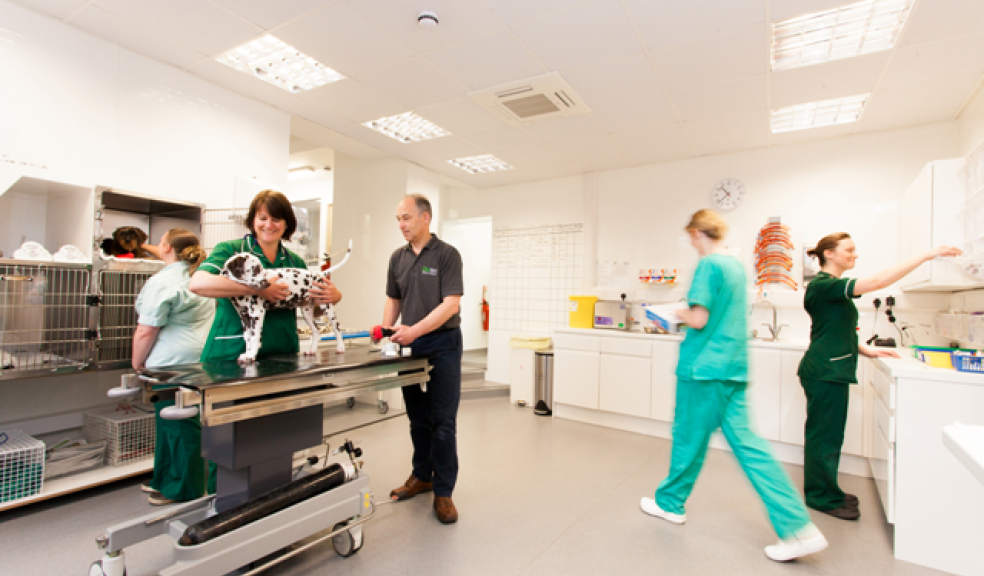
Exeter vets pioneer stem cell treatment
CityVets, a Veterinary Practice in Exeter, is using pioneering Adipose Stem Cell treatment on a four year old Siamese cat called Pharaoh who has been diagnosed with a previously untreatable disease called Feline Infectious Peritonitis (FIP).
Using Adipose stem cell therapy, a relatively new treatment that CityVets has been using for chronic arthritis in dogs, Veterinary Surgeon Ed Pattison has adapted this technique using Pharaoh’s own fat cells to create unique stem cells that are used in an attempt to stop the progression of FIP and prolong his life.
FIP in cats is a very difficult disease to diagnose conclusively because it can present in so many different ways, mimicking other diseases.
FIP is an uncommon result of infection with feline coronavirus, a virus which infects many pedigree cats without causing disease. Many healthy cats test positive for coronavirus antibodies and there is no single test currently available which confirms whether a cat has FIP or not.
With the help of FIP researcher Dr Diane Addie, of www.catvirus.com and consultant to the Glasgow University Veterinary Diagnostic Services, FIP was confirmed in Pharaoh with a new test she and her colleagues have developed that has a predictive positive value of 95%.
FIP causes low grade fever, loss of appetite, and gradual weight loss, progressing to organ failure and in a short time the need for euthanasia.
When Pharaoh was brought into the CityVets Hospital in Exeter in October last year, his vets performed all the usual checks for the commonest causes of weight loss. This involved looking at Pharaoh’s diet, examining his blood as well as testing for FIV (Cat Aids) and FeLV (Feline Leukaemia Virus): everything tested negative.
During further in depth investigations, CityVets looked at feline coronavirus antibody titre: Pharaoh had very high levels indicating that FIP was a possible but still not certain diagnosis. At this point, Veterinary Surgeon Ed Pattison contacted Christine Standen at Cell Therapy Sciences, a veterinary regenerative medicine company based in Coventry, to discuss his idea of the possibility of using Stem Cell treatment for FIP.
CityVets was put in touch with Dr Addie who is currently researching ways of diagnosing FIP and she agreed to run unpublished test techniques to see whether Pharaoh was likely to have the disease. These tests indicated an almost certain probability that Pharaoh was FIP positive.
Pharaoh underwent surgery to harvest fat cells from which Cell Therapy Sciences could culture and grow 5,000,000 new stem cells which were given back to Pharaoh by intravenous infusion.
Showing no adverse effects from his treatment, he was discharged from CityVets Animal Hospital the same day and is starting to show some signs of recovery. He will be due a second infusion of Adipose Stem Cells today and in due course further samples will be taken to see if the levels of FIP virus have reduced.
Ed Pattison, Veterinary Surgeon at CityVets said: “FIP is a horrible disease that always ends in the loss of a beloved pet. The aim of this pioneering stem cell research is to improve cats quality and length of life and provide other cats suffering with FIP an option of potential treatment.”
Dr Diane Addie, whose dream is to eradicate feline coronavirus and FIP, added “The beauty of Adipose Stem Cell therapy is that it uses the cat’s own cells to combat the disease.
One disadvantage is that it takes 2 weeks or more to obtain the treatment, so it may not be useful for the more acute, effusive (or wet) form of FIP. If it works in cats, it may well work in SARS patients since SARS is also an immune-mediated disease triggered by a coronavirus.
However, we must stress that this is a pilot study, and, if this cat recovers, a proper clinical trial would need to be conducted to assess whether it is effective and what is the best protocol to use. The best treatment for FIP is not to get it in the first place: if you are going to buy a pedigree kitten, make sure your Vet sends a blood sample to the University of Glasgow Veterinary Diagnostic Services to get a certificate saying that the kitten tested negative for feline coronavirus (FCoV) antibodies: we need to put consumer pressure on bad breeders and reward good ones.
It is heartbreaking for families to fall in love with a new kitten only to lose him weeks or months later from this awful disease. I admire Ed for having the courage to try something so new, and I especially applaud Pharaoh’s guardians for being willing to stop at nothing to try to save him.”
Christine Standen at Cell Therapy Sciences commented: “We are delighted to be working with Ed to try to help Pharaoh. Our stem cell therapies are currently being used to treat osteoarthritis but we are always keen to work with pioneering vets such as Ed and Dr Addie to meet other clinical goals. In the world of human medicine stem cells have been reported to have immune mediated and anti-inflammatory effects, so this treatment is an exciting prospect for these poor cats.”
If the stem cell treatment is successful on Pharaoh and provides him with a good quality of life for a long period then it is a usable, widely available treatment for cats who suffer from FIP. If Dr Addie's research proves successful in providing a good diagnostic tool for FIP and the stem cell research works then we can prolong and improve a lot of cats’ lives.

















